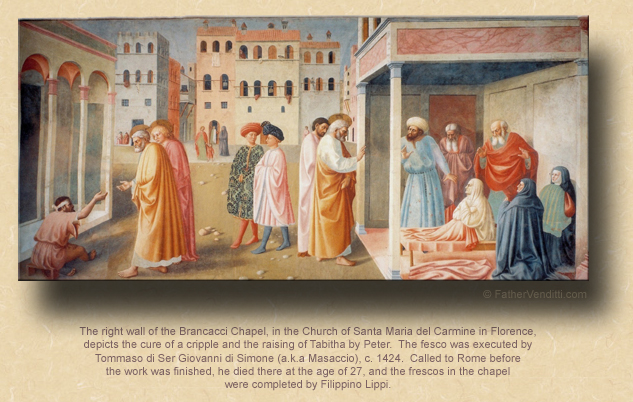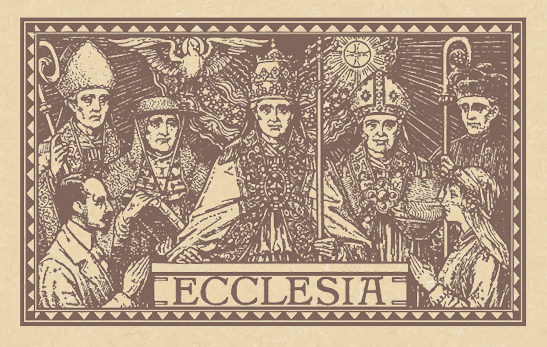Why Can't You Have Christ without His Church? Here's Why!
The Third Saturday of Easter.
Lessons from the feria, according to the ordinary form of the Roman Rite:
• Acts 9: 31-42.
• Psalm 116: 12-17.
• John 6: 60-69.
The Fourth Class Feria of the Blessed Virgin Mary on Saturday.
Lessons from the common, according to the extraordinary form of the Roman Rite:
• Sirach 24: 14-16.
• [The Gradual is omitted.]
• John 19: 25-27.
Myrrh-Bearers Saturday; and, the Feast of the Holy Martyrs Agape, Irene & Chionia.
Lessons from the pentecostarion, according to the Ruthenian recension of the Byzantine Rite:
• Acts 9: 19-31.
• John 15: 17—16: 2.
FatherVenditti.com
|
8:33 AM 4/16/2016 — We've been looking, all this week, at the Apostolic lessons from Acts, and what I wish to draw to your attention today is the event recorded by Saint Luke, always read at Easter time, in which our Lord’s chief disciple, Peter, cures a cripple and raises another disciple named Tabitha from the dead. This is extremely significant because, previously, this was something only God could do;—especially the raising of Tabitha—and, God did do it, on several occasions, in the person of Jesus. He raises his own friend Lazarus from the dead in that famous and dramatic passage read just as Holy Week began; He also raised up the dead son of a widow while he was being carried to his grave; He also raised up the servant of a synagogue official; and, of course, He raised himself from the dead after first descending into the realm of the dead to free the souls held captive there. But there is a sense in which—apart, of course, from our Lord’s own resurrection—this raising of Tabitha by Peter is the most significant, simply by reason of the fact that it is not done by our Lord. For the Fathers of the Church this act had tremendous significance: it is the first indication of our Lord transmitting His own divine power and authority over life and death to His Church in the person of Peter and the Apostles.*

Consider that our risen Lord had just ascended into heaven, just sent the Holy Spirit as tongues of fire to enliven the Apostles; and, already He has given to them His own divine authority over life and death. They are able, in His name, to raise the dead to life. And it is further significant that this authority over life and death is exercised first by Peter, the head of the Apostles, as a way of indicating that there will be order in the Church. The Church will not be a free-for-all, a loose assembly of believers doing as they please; it will have structure and order, and be guided by authority. Even at the very birth of the Church at Pentecost, her structure begins to take shape.
On the night before He died, during the Last Supper, our Lord gave to His Apostles the Blessed Eucharist for the first time, commanding them to do the same; He then breathed on them and gave them the power to forgive sin in confession; He sent His spirit to empower them to preach the Gospel to all nations; and, now, we see the extent of what He has given to His Church in the person of His chief Apostle; for what greater power does Christ possess than that over life and death?  The lesson is clear: the Church is not simply a human institution preserving the traditions of an historical religion. What our Lord gave to Peter and his Apostles they, in turn, passed on to the priests and bishops of the Church in an unbroken line, for the sanctification of the faithful throughout the centuries until He, our Lord, should come again. To love the Church is to love Christ. To reject the Church is to reject Christ. The lesson is clear: the Church is not simply a human institution preserving the traditions of an historical religion. What our Lord gave to Peter and his Apostles they, in turn, passed on to the priests and bishops of the Church in an unbroken line, for the sanctification of the faithful throughout the centuries until He, our Lord, should come again. To love the Church is to love Christ. To reject the Church is to reject Christ.
Of course, in this day and age, that truth can be a hard sell for some people. When someone is unable to make the distinction between the Divine nature of the Church as instituted by Christ and the less-than-divine people to whom the earthly Church has been entrusted, that person can easily become confused. And I’m not talking only about people leaving the Church because of moral scandals among the clergy; in most cases it has nothing to do with a moral scandal: more often than not, people reject the Church because someone in the Church treated them badly.
As a priest, I run into these people from time to time, and you may have, too. For me it happens mostly at funerals. I’ll be burying someone who will have children or nieces and nephews who don’t practice their faith anymore; and I’ll ask them, “Why don’t I ever see you in Church?” And quite often I’ll get a story about how Father So-and-so treated them badly; and it’s usually a priest from another state that I’ve never heard of, so I can’t even know for sure if he exists. And I don’t let them get away with it: I look them right in the eye and say, “What does the conduct of Father So-and-so have to do with the truth of the faith that is preached by the Church that Jesus Christ personally established on this earth?” Of course, they don’t have an answer to that question, which exposes the fact that Father So-and-so—if there is such a person—had nothing to do with it; he was just the excuse. They had, in fact, abandoned the faith in their hearts long before they met Father So-and-so; he simply provided them with a target to absorb the blame so they could stop coming to Church without feeling guilty about it.
I have a friend who is a priest who grew up in a very troubled household with a very abusive father who also happened to be a devout Catholic; and, even though he was able to process this difficult childhood and deal with it quite well, his brother did not. As soon as his father died, the brother stopped going to Church, made a point of marrying outside the Church, and flaunts the fact that he’s not a practicing Catholic every chance he gets, as if putting this difficult childhood behind him requires that he reject everything his father stood for. I don’t presume to judge him because I don’t know what psychological baggage he’s carrying; but, logically it doesn’t make sense: just because his father was a bad person doesn’t mean what his father believed was wrong. Remember a few weeks ago when we were talking about Blessed John Henry Newman, and his distinction between a question and a doubt? A person who questions is looking for answers; a person who doubts is looking for an escape. If what we’re looking for is an excuse to abandon Christ and His Church, we will find it, and we will find a way to make it everyone’s fault but ours.
In the Holy Sacrifice of the Mass, Christ comes among us disguised as bread and wine, but this does not happen on its own. It happens through the instrument of the Church, to whose priests our Lord gave this power. Certainly we can pray to Christ on our own, but we can only do so because Christ is already among us, and Christ is among us only because His Church is among us. If we are separated from the Church, we are separated from Christ. Consequently, as long as we remain in the Church, we can never be separated from our Lord.

* After reading the description of the fresco displayed here, cf. the post for the Third Sunday of Easter here to view a fresco on another wall of the same chapel by Lippi, and compare Masaccio's muted style, reminiscent of that of Fra Angelico, to the more detailed approach by the more mature Lippi.
|

